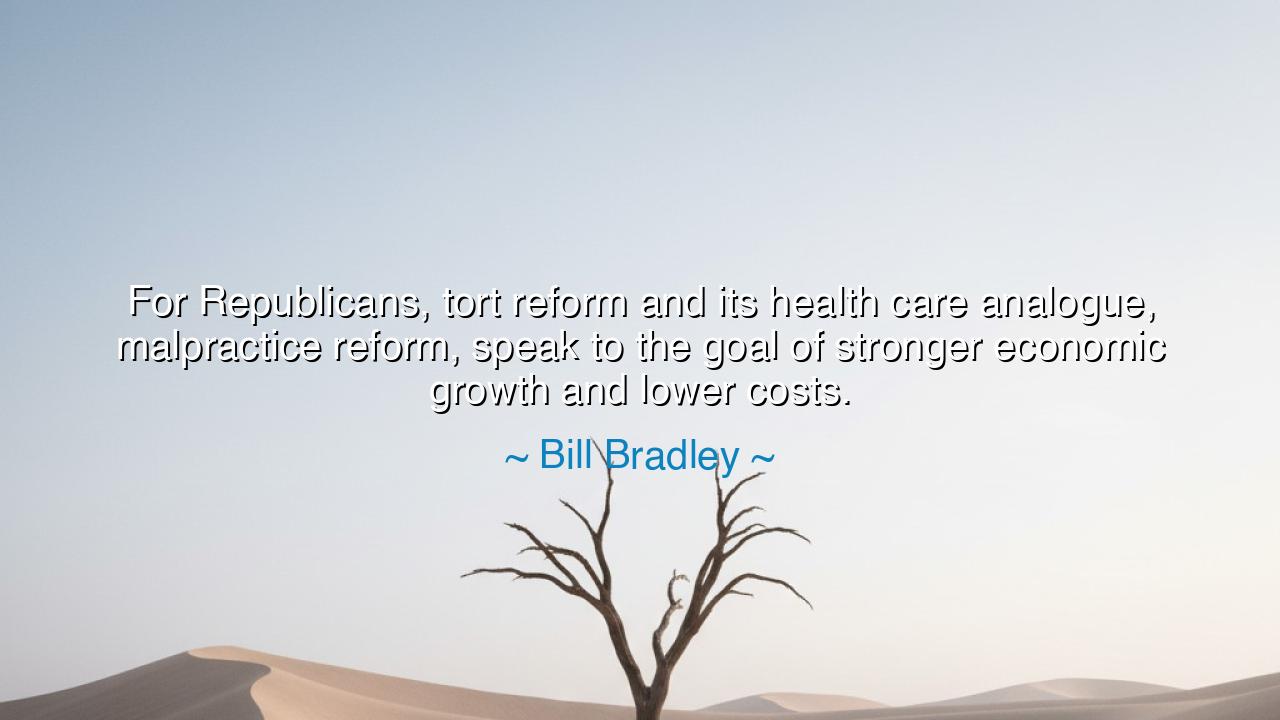
For Republicans, tort reform and its health care analogue
For Republicans, tort reform and its health care analogue, malpractice reform, speak to the goal of stronger economic growth and lower costs.






“For Republicans, tort reform and its health care analogue, malpractice reform, speak to the goal of stronger economic growth and lower costs.” — Bill Bradley
Listen, O seeker of wisdom, to the voice of Bill Bradley, a man who once walked the twin paths of statesmanship and service, athlete and philosopher, speaking of the intricate dance between justice and economy, between law and healing. In this saying, he reflects upon the ideals of those who seek to temper the hand of law in matters of medicine and business — a vision known as tort reform and its reflection, malpractice reform. These reforms, in the eyes of their advocates, are meant to free the flow of commerce from fear, to release doctors, healers, and builders from the heavy chains of litigation, and to kindle the flame of economic growth. Bradley, with the calm of a scholar and the insight of a witness, describes not merely policy, but the deeper philosophy that drives a people to seek balance between justice and prosperity.
The origin of this quote lies in the long and turbulent dialogue of American governance — a dialogue between those who view law as the protector of the weak and those who see it, when unrestrained, as a snare upon the strong. In the world of medicine, the question becomes one of malpractice reform: how to shield patients from harm while preventing doctors from being paralyzed by the constant threat of lawsuits. Bradley, though himself a Democrat, speaks with the voice of understanding, recognizing that Republicans view these reforms as instruments not of cruelty, but of efficiency — as the pruning of excess branches to allow the tree of the economy to flourish. To them, a system too burdened by fear cannot heal, cannot build, cannot innovate.
In his words, we hear echoes of an older struggle: the eternal search for balance between freedom and responsibility. For in every age, societies have wrestled with this dilemma — how to protect the innocent without stifling the bold. The philosopher may dream of perfect justice, but the statesman must contend with human imperfection: greed, error, and fear. Thus, tort reform emerges as an effort to restrain the extremes of litigation, to prevent the pursuit of compensation from becoming a weapon of profit rather than fairness. Bradley’s reflection carries no scorn, but a recognition that such reforms, rightly guided, may indeed strengthen the nation by restoring confidence to those who labor under the weight of constant scrutiny.
Consider the story of the Industrial Revolution, when factories rose and machines thundered across the lands. In those days, many were injured, and few had recourse against their employers. The law grew to protect them, to hold the powerful accountable for negligence and greed. But as decades passed, the pendulum swung — lawsuits multiplied, costs soared, and industries slowed under the burden of endless claims. So too in medicine, where the healer, once guided by conscience, came to fear the courtroom more than the disease itself. Many began to practice defensive medicine, ordering unnecessary tests and procedures not out of need, but out of protection. Thus, the very cost of care rose like a tide, threatening to drown both patient and physician.
It is in this landscape that Bradley’s words shine with clarity. He acknowledges that Republicans, in pursuing malpractice reform, do so not to dismiss justice, but to restore balance — to ensure that the healer may heal without fear, and that the nation’s resources be spent on wellness rather than warfare of the courts. He sees in their philosophy a belief that economic strength and moral fairness need not be enemies, but allies, if governed by wisdom. Yet he also implies a caution — that reform must not become neglect, that in cutting the excess, we do not wound the innocent who seek rightful redress.
The lesson in this teaching is both civic and personal. It reminds us that progress is not found in extremes, but in equilibrium. Just as the body requires both rest and motion, the nation requires both freedom and accountability. Laws must protect, but not suffocate; reforms must liberate, but not abandon compassion. When the pursuit of justice forgets mercy, or when the quest for efficiency forgets fairness, both collapse. The wise citizen, therefore, must look beyond party lines and remember that every policy, whether liberal or conservative, is but a tool — and tools serve only those whose hearts are guided by truth.
Therefore, O listener, take this wisdom as a call to reflection. In your own life, seek balance between restraint and action, between caution and courage. Support systems that uplift both healer and patient, worker and employer, justice and growth. For as Bill Bradley reminds us, a nation thrives not when it chooses between prosperity and compassion, but when it unites them. The true strength of any people lies not in the silence of the courts, nor in the wealth of the few, but in the harmony between fairness and freedom — where health, justice, and growth walk side by side into the dawn of a wiser age.






AAdministratorAdministrator
Welcome, honored guests. Please leave a comment, we will respond soon